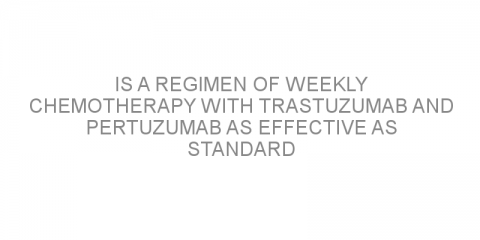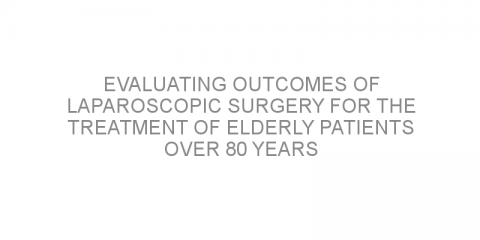In a nutshell This study reported the long-term effectiveness and safety of adding carboplatin (Paraplatin) with or without veliparib (ABT-888) to standard chemotherapy given before surgery (neoadjuvant chemotherapy; NACT) in patients with early-stage triple-negative breast cancer (TNBC). The data showed that the addition of carboplatin to standard NACT...
Read MoreCurrent stage?-Stage II Posts on Medivizor
Evaluating the effectiveness and safety outcomes of second radiation therapy in patients with locally recurrent prostate cancer.
In a nutshell This study investigated the effectiveness and safety of re-irradiation for the treatment of patients with locally recurrent prostate cancer. The data showed that the use of re-irradiation in these patients was associated with good outcomes and low toxicity. Some background Radiotherapy (RT) is an effective treatment for localized...
Read MoreExtended therapy with letrozole for 5 years improves survival outcomes in postmenopausal patients with hormone positive early-stage breast cancer.
In a nutshell This study compared the effectiveness and safety of extended therapy with letrozole (LET; Femara) for 5 years versus the standard therapy of 2-3 years for the treatment of postmenopausal women with early-stage breast cancer (BC). The data showed that extended treatment with LET for 5 years significantly improved the survival outcomes...
Read MoreEvaluating short-course radiation therapy followed by chemotherapy for patients with rectal cancer.
In a nutshell This study evaluated short-course radiation therapy (RT) followed by chemotherapy as a non-surgical treatment of patients with rectal cancer (RC). The data showed that treatment with short-course RT and chemotherapy is safe and effective for these patients. Some background Colorectal cancer (CRC) is one of the most common types of...
Read MoreDoes tyrosine kinase inhibitors therapy after surgery benefit patients with EGFR-mutant resected NSCLC?
In a nutshell This study evaluated whether patients with non-small-cell lung cancer (NSCLC) having genetic mutations could benefit from epidermal growth factor receptor (EGFR) tyrosine kinase inhibitors (TKIs) therapy after surgery. The data showed that EGFR-TKI therapy after surgery significantly improved survival without disease progression in...
Read MoreShould 18F-fluciclovine-PET/CT be included into the decision-making process for radiotherapy after surgery for prostate cancer?
In a nutshell This study evaluated the role of 18F-fluciclovine-PET-CT versus conventional imaging (bone scan and either CT or MRI) alone for salvage radiotherapy (RT) after prostate surgery for the treatment of patients with localized prostate cancer (PCa). The data showed that including 18F-fluciclovine-PET-CT into the decision-making process for RT...
Read MoreDoes lumpectomy followed by radiation improve survival outcomes in HER2 positive and triple-negative breast cancer with high tumor-infiltrating lymphocytes?
In a nutshell This study evaluated the survival outcomes after lumpectomy followed by radiation versus mastectomy alone in patients with early-stage HER2-positive (HER2+) breast cancer (BC) and triple-negative breast cancer (TNBC) with low or high tumor-infiltrating lymphocytes (TILs). The data showed that lumpectomy followed by radiation improves...
Read MoreTreating castration-resistant prostate cancer that has not spread using new hormonal therapies
In a nutshell This study analyzed the effectiveness and safety of new hormonal therapies (nHTs) in patients with non-metastatic castration-resistant prostate cancer (CRPC). The authors concluded that nHT improved the outcomes of these patients. Some background CRPC is an aggressive type of prostate cancer that is resistant to androgen...
Read MoreDoes nerve-sparing status impact surgical margin location for recurrence of prostate cancer after prostate surgery?
In a nutshell This article looked at the impact of nerve-sparing (NS) surgery on positive surgical margin (PSM) location and the recurrence of tumors in patients following radical prostatectomy (RP; prostate removal surgery). The authors found that having NS surgery on both sides of the prostate increased the risk of PSM and was associated with a higher...
Read MoreIs a regimen of weekly chemotherapy with trastuzumab and pertuzumab as effective as standard treatment options for HER2-positive breast cancer
In a nutshell This study examined the use of paclitaxel (Taxol) and carboplatin (Paraplatin) as weekly chemotherapy (CT) with trastuzumab (Herceptin) and pertuzumab (Perjeta) in HER2+ breast cancer (BC) in order to reduce toxicity rates. The authors found that the weekly regimen of chemotherapy can be considered an alternative to standard chemotherapy...
Read MoreEvaluating outcomes of laparoscopic surgery for the treatment of elderly patients over 80 years with colorectal cancer.
In a nutshell This study evaluated the short- and long-term outcomes of laparoscopic surgery (LS; keyhole surgery) for the treatment of elderly patients with colorectal cancer (CRC) aged over 80 years. The data showed that LS is a good and safe option for these patients. Some background Colorectal cancer (CRC) is one of the most common types of cancer...
Read MoreEvaluating the effectiveness and safety of total neoadjuvant therapy versus standard neoadjuvant chemoradiotherapy for locally advanced rectal cancer.
In a nutshell This study investigated the effectiveness and safety of total neoadjuvant therapy (TNT) versus standard neoadjuvant chemoradiotherapy (CRT) for the treatment of patients with locally advanced rectal cancer (LARC). The data showed that TNT was associated with improved outcomes compared with standard CRT for these patients. Some background...
Read More














